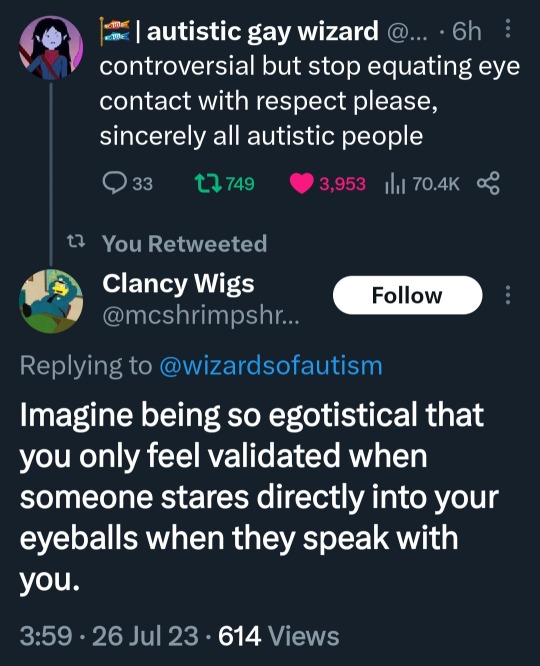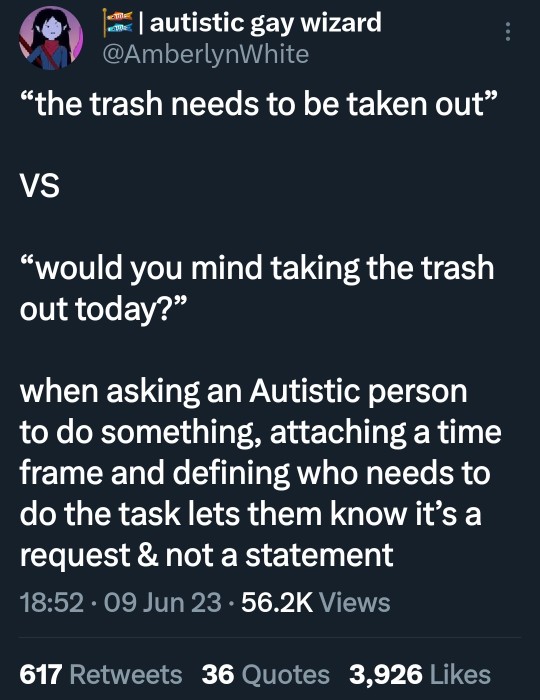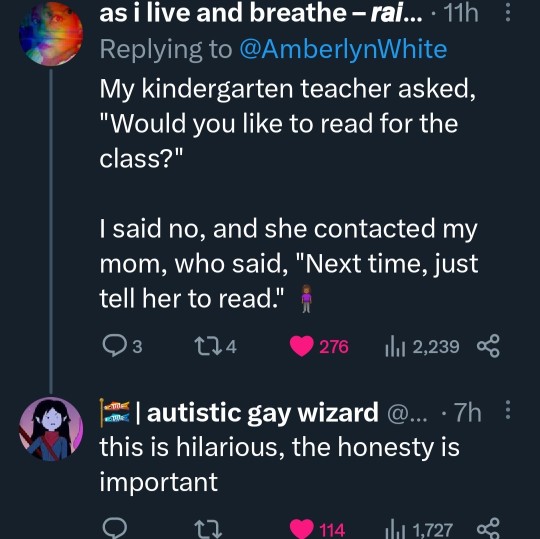#communicationtips
Explore tagged Tumblr posts
Text

Saturday, July 15, 2023 controversial but stop equating eye contact with respect please, sincerely all autistic people - autistic gay wizard, @wizardsofautism
Imagine being so egotistical that you only feel validated when someone stares directly into your eyeballs when they speak with you. - Clancy Wigs, @mcshrimpshramps
~~~~~~~~~~~~~~~~~~~~~~~~~~~~~~~~~~~~~~~~~~~
The image was, initially, shared to Instagram; check it out here! Interested in seeing where the image came from? If so, check it out here! Watch MonriaTitans on Twitch and YouTube!
#autisticgaywizard#wizardsofautism#clancywigs#mcshrimpshramps#autistic#autisticpeople#actuallyautistic#controversial#eyecontact#respect#egotistical#validated#communication#communicatingwithautisticpeople#communicationtips#neurodivergent#neurotypical#neurotypicalprivilege#neurotypicalshavethecommunicationdeficits#fightstupidity#fightignorance#learnsomethingneweveryday#becomesmartereveryday#monriatitans#mt#actuallyneurodivergent
16 notes
·
View notes
Text
Step into the spotlight with confidence! Dive into our latest article on ProTouchPro and master the art of public speaking. Whether you're a novice or looking to refine your skills, our expert tips will guide you towards delivering compelling, impactful presentations. Learn how to captivate your audience, overcome anxiety, and make every word count. Start your journey to becoming a persuasive and memorable speaker today!
5 notes
·
View notes
Text
youtube
Most job roles and industries require public speaking to engage and communicate with team members and audiences. While public speaking can be stressful, this skill set makes you a more competent and appealing employee. Understanding the importance of public speaking can help you create strategies to improve your skills and help ensure you become an effective communicator in the workplace.
#jaynelatz#publicspeakingtips#publicspeakingtechniques#speakingskills#confidence#speakingtips#communicationskills#careerdevelopment#publicspeaking#communicationtips#speakingpractice#skills#skillset#personalgrowth#personaldevelopment#speakingpotential#concisecommunicator#corporatespeechsolutions#presentationtips#charity#nationalspeaker#Youtube
3 notes
·
View notes
Text
Confidence in communication starts with:
👀 Eye contact to show engagement 🎤 Clear and controlled voice 🙌 Gestures that match your words
Work on these skills and transform your speaking abilities! 🌟
coachnvaya.com
#ConfidentSpeaking#PublicSpeaking#SoftSkills#Leadership#SuccessMindset#SpeakingSkills#SelfImprovement#CommunicationTips
0 notes
Text
"Ready to spice up your greetings? 🎉 Check out these other ways to say hello to everyone and make your conversations more engaging! Whether it's for a casual meet-up or a formal setting, these alternatives will have you covered.
0 notes
Text

#communicationtips#directcommunication#assertiveness#clearcommunication#respectfulcommunication#howtocommunicate#effectivecommunication#relationshipadvice#personaldevelopment#selfimprovement#boundaries#conflictresolution#talkwithconfidence#socialskills#conversationtips#kindanddirect#honestcommunication#listeningtips#workplacetips#communicationskills#difficultconversations#beingstraightforward#selfgrowth#mindsetshift#assertivecommunication#lifetips#relationshipskills#communicationhacks#beassertive#everydaycommunication
0 notes
Text
How to Support Your Partner Without Controlling Them
"Support your partner without trying to change who they are. True love is about mutual respect, trust, and growth. Learn how to build stronger relationships while embracing individuality. 💕�� Read more:
Relationships can feel like walking a tightrope at times—balancing love, support, and trust without tipping over into control. We’ve all had moments of thinking. We imagined, If only my partner would do this one thing differently, everything would be perfect. But love isn’t about sculpting your partner into an ideal; it’s about accepting and supporting them as they are. Whether you’re a…
#CommunicationTips#CoupleGoals#healthyrelationships#LoveAndSupport#MutualGrowth#PersonalGrowth#relationshipadvice#TrustAndRespect
1 note
·
View note
Text
Improving Communication Skills

Get the full podcast to improve your communication skills
Welcome to "Mastering Communication: Unlocking the Power of Your Voice," a podcast dedicated to helping you elevate your communication skills for both personal and professional growth. Whether you’re looking to build confidence, improve your speaking presence, or connect more deeply with others, this podcast has the tools and insights you need.
Get the full podcast to improve your communication skills
In each episode, we’ll explore key aspects of effective communication, including vocal image, the power of body language, active listening, and emotional content. Learn how to strategically vary your speaking rate, volume, pitch, and tone, and discover the crucial role of pauses and nonverbal cues in engaging your audience.
Get the full podcast to improve your communication skills
We’ll dive into practical strategies, such as how to overcome anxiety, craft compelling stories, and even add wit to your conversations. Whether you’re preparing for an interview, delivering a presentation, or just looking to connect better with the people around you, "Mastering Communication" will provide you with actionable insights and exercises to enhance every aspect of your communication.
Get the full podcast to improve your communication skills
Join me on Patreon, where you can access exclusive content, practical exercises, and in-depth discussions designed to help you communicate with confidence, authenticity, and impact. Let's unlock the power of your voice together!
#CommunicationSkills#PersonalGrowth#PublicSpeaking#VoiceTraining#NonverbalCommunication#ActiveListening#VocalImage#SelfImprovement#ConfidenceBuilding#CommunicationTips#Storytelling#BodyLanguage#CareerDevelopment#InterviewTips#EmotionalIntelligence#SpeakWithConfidence#SelfAwareness#MindfulCommunication#VerbalCommunication#PublicSpeakingTips
0 notes
Text
Top 5 Family Therapy Techniques to Improve Communication
Effective communication is the foundation of a healthy family dynamic. Whether you’re dealing with misunderstandings, conflicts, or just want to strengthen your family bond, family therapy techniques can help. Here are the top 5 techniques to improve communication in your family:

1. Active Listening
Active listening is all about giving your full attention to the speaker and showing that you understand what they are saying. In family therapy, this technique encourages everyone to listen without interrupting or judging. It helps create a safe space where each person feels heard and valued.
How it helps: It reduces misunderstandings and makes everyone feel respected, fostering trust and empathy.
2. "I" Statements
Instead of pointing fingers with "You always..." or "You never...", family members are encouraged to use "I" statements, such as "I feel upset when..." or "I need more support with...". This focuses on personal feelings rather than blaming, which can help lower defensiveness.
How it helps: It promotes honest communication without causing arguments or hurt feelings.
3. Time-Outs for Cool-Downs
When things get heated, taking a short break is vital. A "time-out" allows family members to step away, calm down, and collect their thoughts before continuing the conversation. This helps prevent saying things in anger that could hurt the relationship.
How it helps: It prevents escalation and helps families communicate in a calm and controlled manner.
4. Family Meetings
Regular family meetings are a great way to check in with each other, share concerns, and solve problems together. These meetings create an open forum for everyone to voice their thoughts and ideas without judgment. It’s important to establish a positive, non-judgmental environment.
How it helps: It strengthens the family’s connection and provides a structured space for problem-solving and support.
5. Empathy Building
Empathy is about understanding and sharing the feelings of another person. In family therapy, families are encouraged to put themselves in each other’s shoes. By practicing empathy, family members learn to respond with care, instead of frustration or anger.
How it helps: It fosters compassion and reduces conflict by making everyone feel understood and supported.
Conclusion
Improving communication in your family is a journey that takes time, patience, and effort. By practicing these techniques—active listening, "I" statements, time-outs, family meetings, and empathy building—you can build stronger, more supportive relationships with your loved ones.
#FamilyTherapy#CommunicationTips#HealthyFamily#ActiveListening#FamilySupport#EmpathyInFamilies#FamilyBonding#TherapyTechniques#EffectiveCommunication#MentalHealthAwareness
0 notes
Text
How To Make Your Message More Memorable

Would you like to make sure that your message is understood? 📝✨ Here are a few easy ways to make an impression!
You can start by being succinct and straightforward; get right to the point. 💬🔥 Bring your ideas to life with storytelling, and for added effect, include images.
🎨👀 Remember to use relatable examples or queries to get your audience interested. Your message will be significant and unforgettable if you take the proper technique! 💡💬
#EffectiveCommunication#MessagingTips#CommunicationTips#ContentCreation#PowerfulMessaging#CreativeCommunication#CommunicationStrategies
0 notes
Photo





Saturday, June 10, 2023 Growing up, the "would you mind" question was the nice way of telling us to do something without telling us.
My younger sister said "no" the first time she was "asked" and was SO CONFUSED when dad got annoyed.
I don't remember how I reacted the first time I was "asked", but I completely understood her confusion.
I could have gone all day taking screenshots of this thread, but you get the point.
GET TO THE POINT!
~~~~~~~~~~~~~~~~~~~~~~~~~~~~~~~~~~~~~~~~~~~
The image was, initially, shared to Instagram; check it out here! Interested in seeing where the quote came from? If so, check it out on @AmberlynWhite's Twitter thread here! Watch MonriaTitans on Twitch and YouTube!
#amberlynwhite#autisticgaywizard#autism#asd#communication#autisticcommunication#communicationtips#communicatingwithautisticpeople#gettothepoint#actuallyautistic#twitterthread#educational#educationalpost#educationalposts#learnsomethingneweveryday#becomesmartereveryday#monriatitans#mt#fightignorance#fightstupidity
15 notes
·
View notes
Text
#TextMessaging#SMSMarketing#CommunicationTips#MessageScripts#AudienceEngagement#WritingTips#MarketingStrategies
0 notes
Text
Tips for a Successful First Online Chat
Starting your first online chat can both feel quite exciting and scary all at once. To help you navigate this new experience with confidence, here are some essential tips: 1.Be Prepared: It is recommended that a user to consider what type of material he or she wishes to process before the chat begins. This will assist you feel more yourselves and therefore more likely to pay attention. 2.Introduce Yourself: Silent opinions are not shared, the first days are announced with a friendly greeting. Introduce yourself a little in order to start the conversation! 3.Ask Open-Ended Questions: Help the conversation to generate some activities by asking questions which may compel the other person into offering more details. 4.Be Attentive: Pay close attention to the other person. Inform their ideas to let them know you are listening. 5.Stay Positive: Being happy can result in creating conducive environment within and between people as they chat.
Read more: Tips to make your first online chat successful
0 notes
Text
Reading
I borrowed a book from Libby called How to Talk to Anyone. I really like it so far. I am excited to learn a lot from this book, because I'm autistic and social interactions are difficult. There are 52 tips in all and so far, I am on tip 3.
0 notes
Text

The wait is finally over! Our blog on communication for different platform is live- go check it out and learn how to tailor your message to various organisations, individuals, cultures and communities for maximum impact and success.
Learn More : https://www.nextdimensionstory.com/post/mastering-the-art-of-communication-adapting-your-persona-for-different-platforms
#communicationmatters#effectivecommunication#communicationtips#tailoryourmessage#communicationforsuccess
0 notes
Text
Starting something new and received a warm welcome? 🥰 Knowing how to express gratitude properly helps build great relationships! Whether it's for a new job, a social event, or an online group, this guide will help you respond the right way.
Check it out here: https://grammarecho.com/thank-you-for-the-warm-welcome/
0 notes